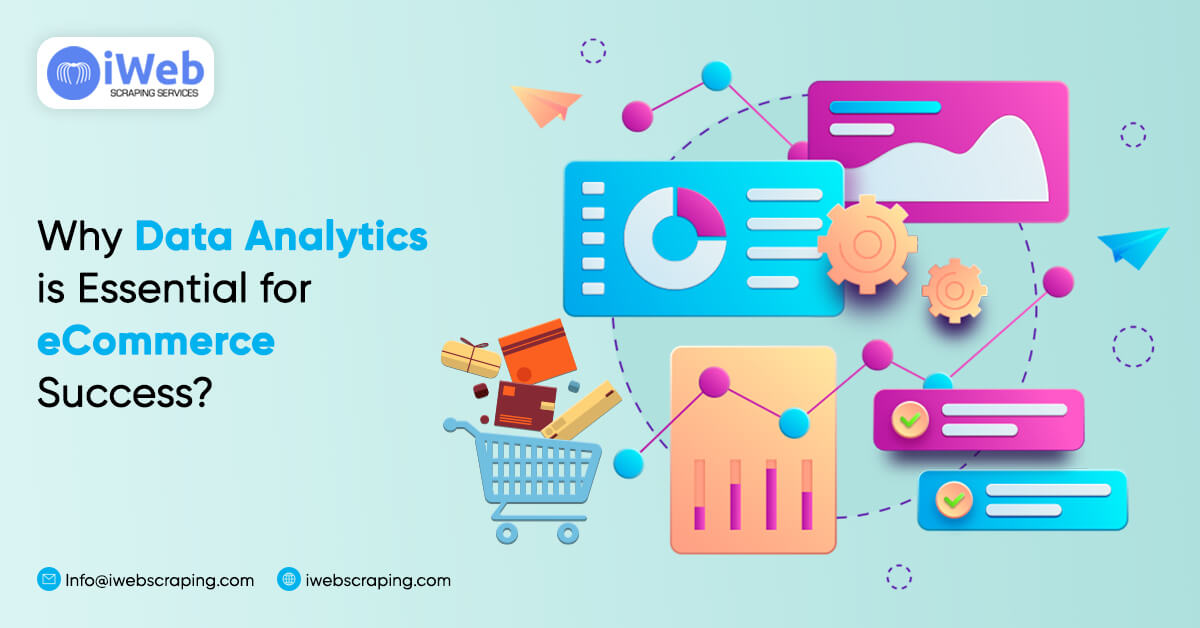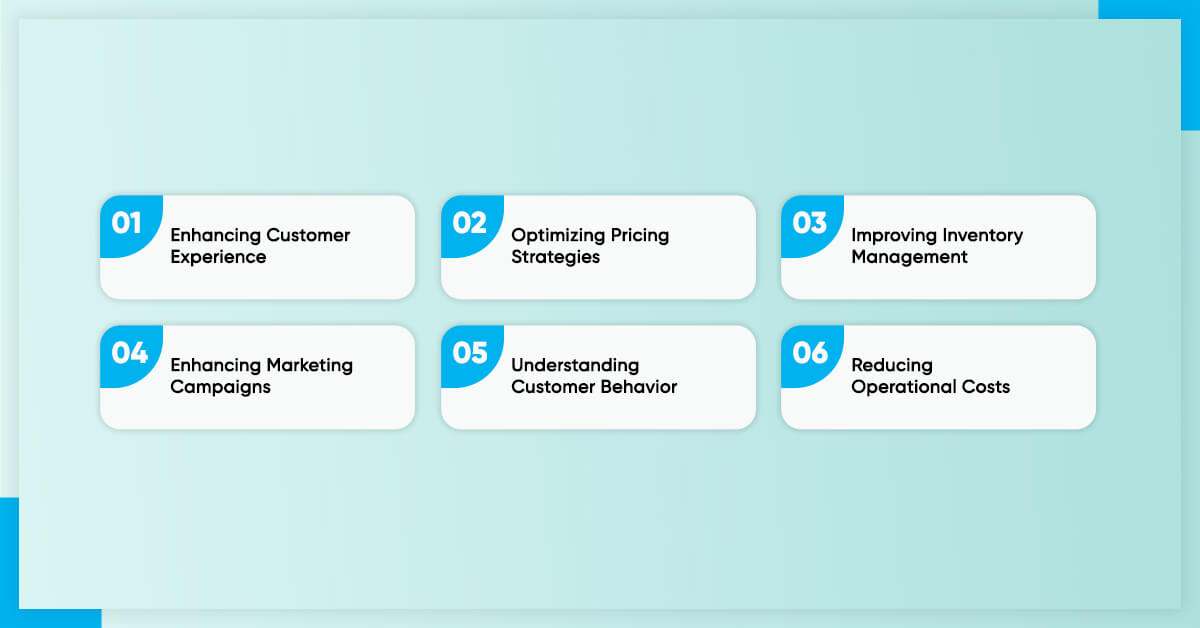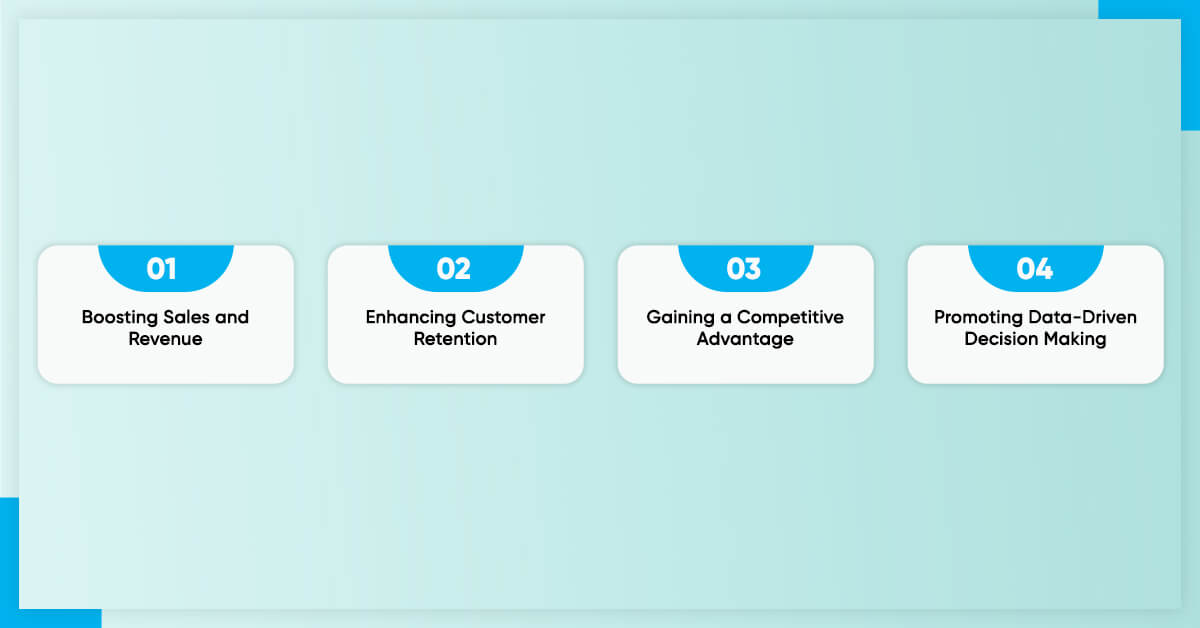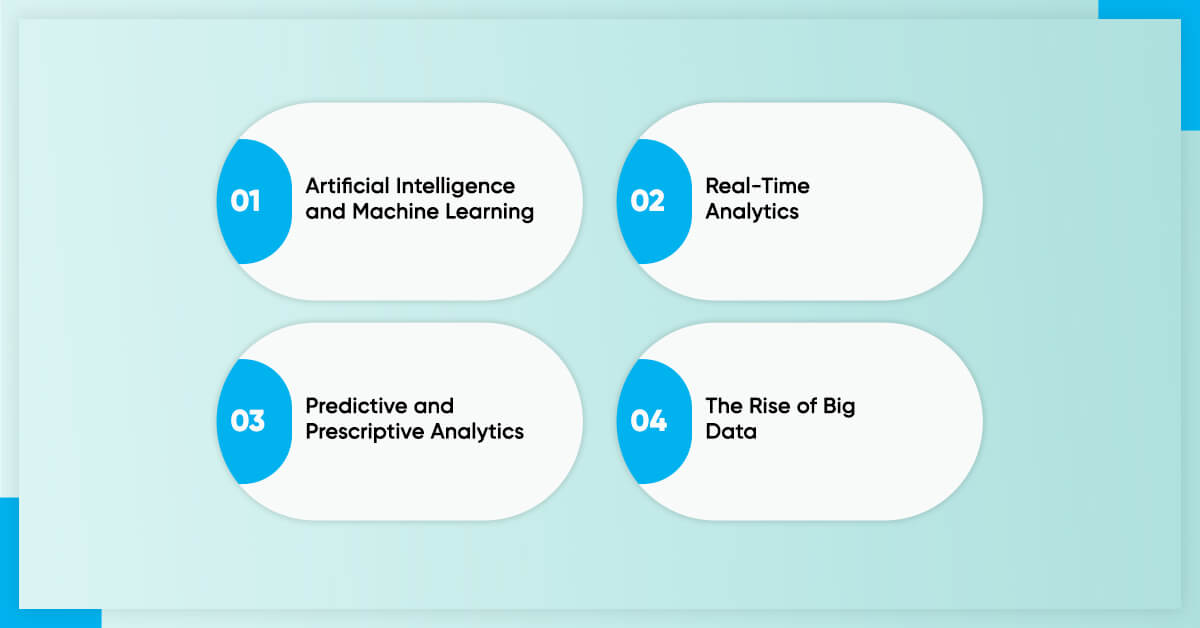Why Data Analytics is Essential for eCommerce Success?

Data has become very important for businesses, especially those in online retail. Companies must use data to understand customers, improve sales, and work more efficiently to stay competitive. This blog will explain why data is so crucial for eCommerce success.
What is Data Analytics?
Analyzing data helps businesses understand patterns and trends. This information can help you make better decisions and improve customer understanding. In an e-commerce business, you can use data analysis to study customer behavior, sales trends, and website performance.
What Are The Types of Data Analytics?
- Descriptive Analytics: Descriptive analytics is looking at past information to see what happened before. For instance, a business might use it to check how much they sold last month.
- Diagnostic Analytics: This type of analysis uses data to explain why something happened. For example, if sales went down last month, diagnostic analytics would help us understand why.
- Predictive Analytics: Predictive analytics means using old information to guess what might happen in the future. For example, in e-commerce, this could involve predicting future sales based on past sales data.
- Prescriptive Analytics: The highest level, prescriptive analytics, advises on what actions to take after studying the information. For instance, it might suggest changing prices or promotions to increase sales.
What is eCommerce Data Analytics?
Using information from your eCommerce website, like how much you sell, the average amount customers spend, how many people visit your site, the number of successful purchases, and how many times people leave without buying anything, to help plan how you will sell things in the future is called eCommerce data analytics. This study is essential for online stores because almost 70% of people who look at things in an online store leave without buying anything.
eCommerce Websites need to know why this happens, like if the checkout process is too complicated, if the website has problems, or if the return policy needs to improve. By studying the information from the website, online stores can get ideas about improving their sites and figure out what customers think indirectly.
Why Should Tracking Data Be Important To You?
In difficult times when money is tight, it's essential to be smart about how you spend and sell things online. Making good choices based on accurate information is very important, instead of just guessing. Many businesses rely on their gut feelings or past experiences, which can be problematic. Online businesses must use information to strengthen their marketing and sales strategies and focus on customers' wants.
Information from data analytics can tell you a lot about your competition and the general trends in your industry. When you understand this information, you can make better choices about how to run your business, which is especially important when times are tough.
What Are The Role Of Data Analytics In Ecommerce?

In the fast-changing world of online shopping, information is essential. It's not just numbers—it helps businesses do well. Information helps us understand how people shop online, making our company better and allowing us to stay ahead of other businesses. But what exactly is the role of data analytics in eCommerce? Let's dive in and explore how it shapes and strengthens online companies.
Enhancing Customer Experience
One significant advantage of using data analytics in eCommerce success is that it helps improve customers' shopping experience. By looking at information about what customers do, businesses can learn what they like, what they don't like, how customers buy things, and what they prefer. You can use this information to make the shopping experience more personal so it's fun and just right for each customer.
For example, if a customer often buys a particular brand of shoes, the online store can suggest similar products or let them know when new shoes from that brand are available. This kind of personalized service not only makes customers happier but also helps sell more.
Optimizing Pricing Strategies
Knowing the correct prices to set is essential for online stores. Data Analytics can help businesses determine what prices will help them make the most money while still being competitive.
For example, they can change prices in real time based on how many people want to buy something. Data analysis helps them find the best prices to attract customers and make a good profit.
Improving Inventory Management
Analyzing information about sales can help companies better handle the products they have for sale. Companies that need more products might lose sales and spend more money. By studying how much they sold in the past, companies can guess how much they'll sell in the future and manage their products better.
For instance, if the data shows that a particular product usually sells more during holidays, the company can ensure it has enough stock to meet the increased demand. On the other hand, if a product's sales are going down, the business can decrease its inventory to avoid having too much.
Enhancing Marketing Campaigns
Marketing is essential for online businesses, and using data analysis can help businesses create better marketing plans. By looking at customer information, companies can determine the best ways to reach the people they want to sell to, the kinds of deals that customers like, and the best times to run marketing campaigns.
For example, if the data shows that a particular group of people likes getting emails about products, the company can send them more emails. Or if a specific kind of deal, like discounts or free shipping, always makes people buy more, the company can use that information for future marketing.
Understanding Customer Behavior
In e-commerce, it's essential to know how customers act. Data analysis helps with this. By looking at how customers use the website, companies can see trends in how customers look at things, buy things, and decide to purchase.
For instance, if data shows that customers often leave their shopping carts during checkout, the business can investigate and address potential issues, such as complicated forms or unexpected costs. By improving the user experience, companies can reduce cart abandonment rates and increase conversions.
Reducing Operational Costs
Data analysis can also help eCommerce businesses save money. By examining data on different parts of the industry, such as shipping, returns, and customer service, companies can find where to spend less money.
For example, if the data shows that a specific way of shipping consistently causes delays, the business can look at other options to improve delivery times and spend less money. Similarly, if many returns happen because product descriptions are wrong, the company can work on making the descriptions more accurate.
What Is The Impact of Data Analytics on eCommerce Success?

Data analysis is very important for businesses. It helps them understand what customers prefer and how to improve their business. It also helps them sell more. We will look at the real impact of data analytics on eCommerce success.
Boosting Sales and Revenue
One big way that data analysis helps online shopping is by assisting businesses in selling more. Businesses use data to improve prices, personalize the shopping experience, and improve marketing, which allows them to attract more people and make more money.
For instance, Amazon, one of the biggest online stores in the world, extensively uses data analysis. Using data, they suggest products, improve prices, and offer a unique shopping experience, which has helped Amazon succeed in online shopping.
Enhancing Customer Retention
Customer retention is critical for online businesses to succeed. Analyzing customer data can help companies to understand what keeps customers coming back.
For example, companies can see if customers who receive personalized recommendations tend to make repeat purchases. They can also identify customers who last purchased a while ago and offer them special deals to encourage them to return. This kind of data analysis can help businesses improve customer loyalty and retention.
Gaining a Competitive Advantage
In the competitive online shopping world, businesses must find ways to be better than others. By analyzing data, companies can understand what customers and other companies do. That helps them make intelligent choices and stay ahead.
For example, suppose data shows that a rival is gaining more customers by offering lower prices. In that case, a company can change its prices too or offer something special, like free shipping or rewards, to keep its customers happy.
Promoting Data-Driven Decision Making
Data analytics is beneficial for making decisions when shopping online. It's essential to have the correct information when deciding which products to show on a website, where to spend money on advertising, and how to use the budget wisely. Using data to make these decisions can lower risks and improve the chances of success.
What Are The Real-World Examples of Data Analytics in eCommerce?
Data analysis has changed online shopping by using information to help businesses grow. Let's look at real-life examples, like making shopping more personal and managing products better.
Amazon: The Data-Driven Giant
Amazon uses data to personalize the shopping experience, set prices, and improve efficiency. For example, its recommendation engine suggests products based on customer behavior, driving billions of dollars in sales yearly.
Netflix: Using Data to Drive Engagement
Netflix is best known for streaming shows and movies, but it also operates like an online store in some ways. Netflix looks at data to suggest shows and movies to users, pick what content to offer, and keep users interested. By studying what people watch, Netflix can guess what shows and movies will be popular and decide which ones to license or make. This number-focused approach has helped Netflix grow its customer base and make more money.
Zara: Data-Driven Fashion Retailer
A top fashion seller, Zara uses data analysis to keep up with fashion trends and improve its supply chain. The company collects information from its stores, website, and social media to find new trends and customer preferences. That helps Zara quickly change its products to match customers' wants, keeping it ahead of other fashion companies.
What Are The Challenges of Implementing Data Analytics in eCommerce?
Data analysis in an eCommerce business can be complex, with time and effort clear benefits. It's important to understand these challenges to use data analysis effectively.
Data Quality and Integration
One of the main challenges is ensuring that data is of good quality and fits well together. Businesses need accurate, complete, and timely data from different sources, such as customer interactions, sales transactions, and website analytics, to analyze data.
However, data is often messy, incomplete, or inconsistent, which makes analysis difficult. Also, integrating data from different sources into a single unified system can be complex and time-consuming.
Data Privacy and Security
Keeping your information safe when you shop online is essential. Companies must follow specific rules to ensure that your data is secure and won't get stolen. If they do this right, they can keep their customers and make more money. Companies must spend money on keeping their information safe and following the rules.
Skilled Workforce
One big challenge is finding people with the right skills. Data Analytics requires people who are good at working with data, understanding statistics, and using machine learning. However, it takes much work to keep these skilled workers, especially for small businesses. To solve this problem, companies can train their current employees to improve their skills or work with outside experts who are good at data analytics.
What Is The Future of Data Analytics in eCommerce?

Businesses are using information to understand customers and make good choices. It is becoming even more important for online shopping. As technology improves, understanding customer information will help businesses do better and develop new ideas in the future.
Artificial Intelligence and Machine Learning
The way we use information for online shopping is improving because of artificial intelligence (AI) and machine learning. These technologies help businesses analyze a large amount of information quickly and more accurately. AI-powered tools can find patterns and trends that people can't, which makes it easier to predict outcomes and make better decisions.
Real-Time Analytics
Real-time analytics means using data as it comes in to make quick decisions. In online shopping, businesses use real-time analytics to see how many people visit their websites and immediately change their ads to attract more customers.
Predictive and Prescriptive Analytics
In an e-commerce business, using new information to make good decisions is essential. Predictive analytics helps us guess what might happen in the future, while prescriptive analytics tells us precisely what we should do to achieve our goals. Prescriptive analytics can help us set better prices, keep track of our products, and do our marketing more effectively.
The Rise of Big Data
Big data analytics is becoming increasingly important as online businesses gather information. It means studying huge and complicated sets of information to find hidden patterns and insights. That helps companies understand how customers behave, what's happening in the market, and how well they do.
Conclusion
Using data analysis is essential for eCommerce businesses to do well. It helps them make customers happier, sell more, work better, and stay ahead of their competition. But it can be challenging because of keeping information private, ensuring the data is good, and needing people who know what they're doing. Even though it's hard, the good things about data analysis are much bigger than the hard things, so it's worth it for online businesses that want to do well.
As technology improves, data analytics in online shopping will become more and more critical. Businesses that use data analytics and stay ahead of the game will be in an excellent position to do well in the always-changing online shopping world. Whether you have a small online store or a big company, the secret to doing well in online shopping is using data analytics to make intelligent decisions based on information, which will help your business grow and make more money.
iWeb Scraping provides personalized web scraping solutions to assist eCommerce businesses in collecting essential data. Whether you want to monitor your competitors, follow market trends, or understand customer behavior better, iWeb Scraping can gather the data you need to help you make good choices and stay ahead of your competition.




